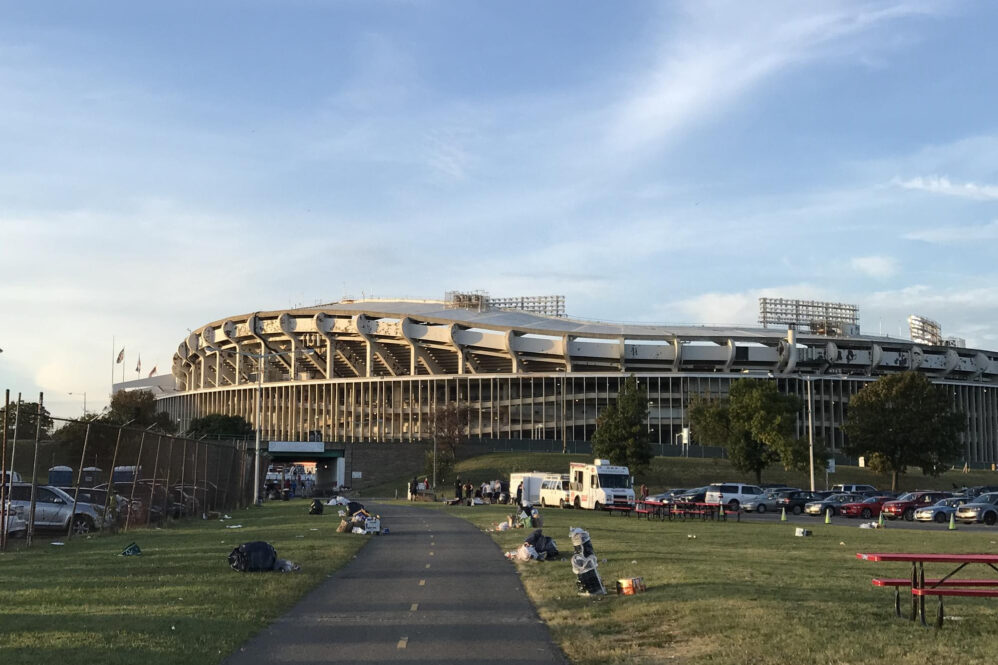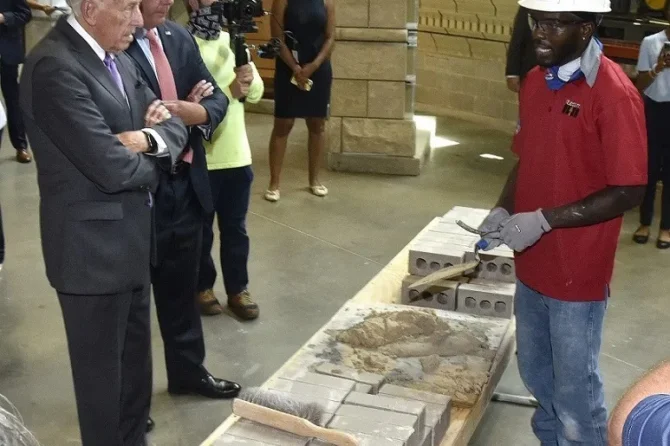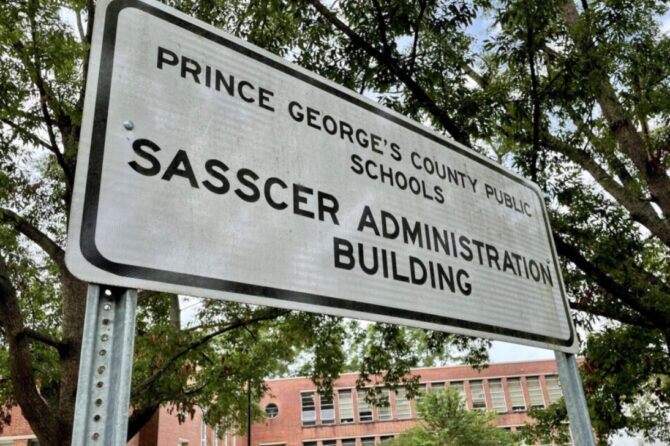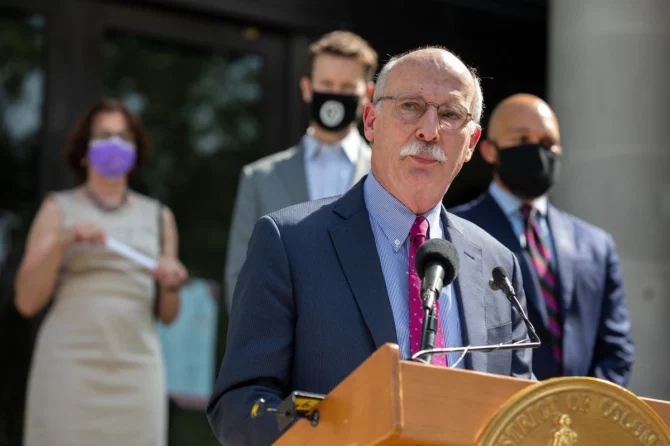WASHINGTON POST: Administration this week also selected a pair of contractors for a $394,000 ‘sports study’ to evaluate funding structures for a potential NFL stadium.
Nearly one month after Mayor Muriel E. Bowser lobbied congressional lawmakers to advance a bill allowing D.C. to redevelop the dilapidated RFK Stadium site — and potentially attract the Washington Commanders in the process — the mayor sought to appease hundreds of skeptical community members inside a church adjacent to the stadium’s grounds.The Wednesday evening gathering at St. Benedict the Moor Catholic Church in Northeast Washington, hosted by the Friends of Kingman Park Civic Association, was so packed that those who showed up late were temporarily instructed to wait outside. While the 250 or so community members and anti-stadium advocates in attendance held varying opinions about the optimal uses for the RFK campus, they shared a collective interest in hearing directly from Bowser (D) — especially about whether taxpayers could foot the bill if a new stadium is built there.Respondents to a survey the association conducted named open green space, a sports recreation complex and new housing as items they’d like to see at the RFK site. One respondent made a plea to city leaders: “This is a tremendous opportunity — please don’t blow it on a billionaire’s playground,” drawing applause from many who attended.“I listened to some of the things that community members said they wanted, and I agree with all of them. And I know that on 174 acres, they are all possible,” Bowser said in response. “And so if you ask me what my vision is, I’ve said long and frequently that it is not to have a stadium surrounded by asphalt, but to have a mix of uses that serve the District of Columbia.”
Bowser has made clear that she wants to transform RFK’s campus into a new stadium for the Commanders as well as a mixed-use development, but she emphasized several times Wednesday that the city’s core focus was on getting control of the land from the federal government. A bill that would extend D.C.’s lease of the site for 99 years and allow for a multitude of uses beyond sports, including the construction of housing, advanced out of a House Oversight Committee last month — but the bipartisan bill still needs to pass through the Senate and House, which at the moment is without a speaker.[House Oversight Committee advances bill to extend D.C.’s lease of RFK site]Adding to the pressure for Bowser as she competes with leaders in Virginia and Maryland in pursuit of the Commanders are the city’s other top professional sports franchises, who are jostling over a limited pool of city funds for major renovation projects at Nationals Park and Capital One Arena. Monumental Sports — which owns the Wizards and Capitals — has even floated leaving D.C. for Northern Virginia.One District official, who spoke on the condition of anonymity to discuss sensitive negotiations, said the mayor’s pursuit of the Commanders has prompted the Nationals and Monumental Sports to engage her administration and the D.C. Council on securing long-term funding for improvements, including a new scoreboard at Nationals Park. In a Sept. 18 letter to city officials including Bowser, D.C. Council Chair Phil Mendelson (D) and Chief Financial Officer Glen Lee, leaders for the Nationals outlined a proposal to create a dedicated revenue fund that would “address these necessary fixes.”The city uses a special pot of money in the budget called the Ballpark Revenue Fund (BRF) to pay down the municipal bonds that financed the ballpark’s construction. The BRF is mostly supplemented by the “ballpark fee” — a tax on individuals who make more than $5 million, which brought in $41.9 million in the 2022 fiscal year — as well as taxes on sales at Nationals Park ($12.4 million in fiscal 2022), public utilities ($7.1 million) and telecommunication companies ($2.3 million).
The city is ahead of schedule in repaying those bonds, which the CFO’s office has said could happen as soon as 2028; and while the ballpark fee will expire at that point, the other taxes will remain, and other sports teams have expressed interest in getting a share of that future revenue.In the letter to city officials, which was reviewed by The Washington Post, Alan Gottlieb — chief operating officer of a business group owned by the Lerner family, which owns the Nationals — suggested that the District repurpose the remaining three major sources of BRF revenue to create a new “Ballpark Modernization & Sustainability Fund.”“Under this proposal, ballpark maintenance and modernization would be paid by the users of the facility,” Gottlieb wrote. He underlined the next sentence: “We need to be very clear: Without such a fund your ballpark will suffer the fate of other facilities that did not modernize and adapt in this competitive environment.”At Wednesday’s meeting, Bowser said that her administration this week selected a pair of contractors for a $394,000 “sports study” to evaluate funding structures for a potential NFL stadium — and to come up with a plan to address the financial needs of the city’s existing professional sports franchises. The study’s contractors include the national real estate management and consulting company Jones Lang LaSalle Americas Inc., and the Robert Bobb Group, headed by the well-connected former D.C. city administrator Robert Bobb. Bobb served under former D.C. mayor Anthony Williams (D) during tense negotiations and disagreement with the council about whether to devote public funds toward building Nationals Park.As part of Bowser’s sports study, the two firms will be tasked with exploring a question that Kingman Park Civic Association organizers said was also front of mind for many in the neighborhood: As one resident wrote in a question to Bowser, would the city use taxpayer dollars to finance a new NFL stadium when there are “other pressing community needs?”In her reply, Bowser harked back to debates around building Nationals Park, which she noted came down to several close votes by the council (members are similarly divided now in their enthusiasm for a Commanders stadium).Ultimately, the ballpark was constructed using nearly $700 million in taxpayer dollars.“The question you just asked me was asked then: Should we be building a stadium for billionaires when we have schools and the like? And the answer was, we’re a big city, we have to do both,” Bowser said, which prompted groans of disagreement from the crowd.She added: “I don’t know many people who don’t think we shouldn’t have the Washington Nationals in Washington. And guess what, in the same amount of time, we’ve built a lot of schools, we’ve invested in public services … we’ve done all those things and we built a world-class arena.”[As Commanders eye RFK, D.C. stadium’s neighbors hope team punts]Conversely, Bowser noted that while the District paid $150 million to prepare the land and infrastructure for the Audi Field project, D.C. United spent some $250 million to construct the stadium there. The mayor declined to offer a specific answer related to public financing at RFK, stating she did not want to get ahead of the sports study that’s underway.“I believe where we will be with RFK, when we get control of it, is that we will prepare the land, the infrastructure — and we’d have to do that anyway whether there’s a stadium there or not,” Bowser said. “We, the taxpayers, are going to develop the infrastructure for the housing, the parks, for all the things you said, it will require the District to invest in the infrastructure. I expect that will be the case at RFK Stadium.”The mayor spent about 40 minutes at the meeting fielding questions about the RFK campus redevelopment, ranging from the amount of green space to parking to ambient noise that would affect Kingman Park; she assured the community they would have additional opportunities to offer input as plans for the site crystallize in the months ahead. Asked if she might even consider another neighborhood for a new stadium, Bowser said that while one other location had been considered, RFK’s campus was the “best site in the region.”When another questioner cited research that suggests sports stadiums are not necessarily economic drivers for cities, Bowser said Nationals Park and Capital One Arena “fly in the face of that conclusion.”Monumental Sports has enjoyed financial success in recent years as thousands of people traveled downtown for sports and entertainment at Capital One Arena, Bowser said — and she highlighted the city’s near-repayment of the bonds that funded Nationals Park as evidence of its economic viability — though some economists credit the expedited repayment to the ballpark fee on high-earning residents rather than the stadium itself.
“We are indeed a growing sports capital — and it’s an important part of our economy … erasing that type of economic activity would be devastating to the things you mentioned you cared about,” Bowser said. “And the revenue around the Capitol Riverfront is allowing us to have world-class infrastructure and services across all eight wards. So we cannot talk about sports as if it’s not also linked to how this city will invest in itself.” The crowd applauded.










